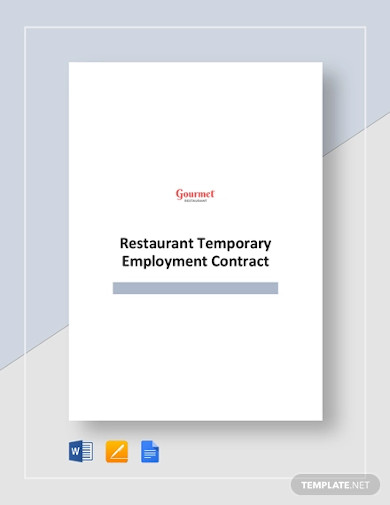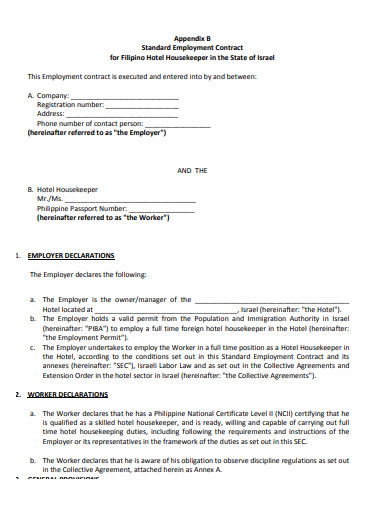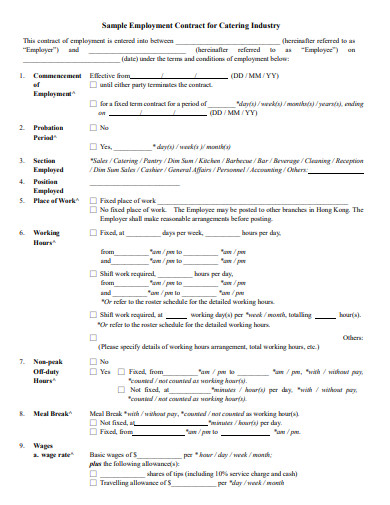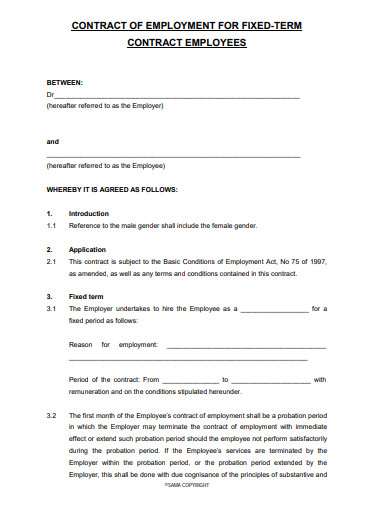5+ Employment Contract for Restaurants Examples to Download
Restaurants, cafes, and bakeries are common businesses that often offer employment or career opportunities. This is very much true whether for part-time and full-time purposes. In the shoes of these enterprises, the search for the right employees is highly competitive. When a job-seeker presents his or her services, such companies conduct evaluations and analyses straight away. Right after that, they hand out a written agreement or contract with high hopes to get it signed as soon as possible. In this standard legal document, employment considerations like salary or payment, job description, termination, and more are discussed. To understand the contract better, we highly recommend you take a look at our article and examples below.
5+ Employment Contracts for Restaurants, Cafes, and Bakeries
1. Restaurant Employment Contract
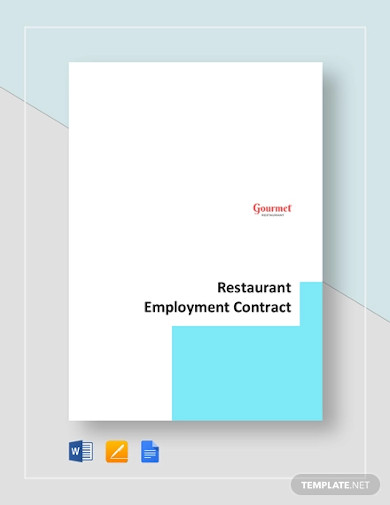
3. Hotel Employment Contract
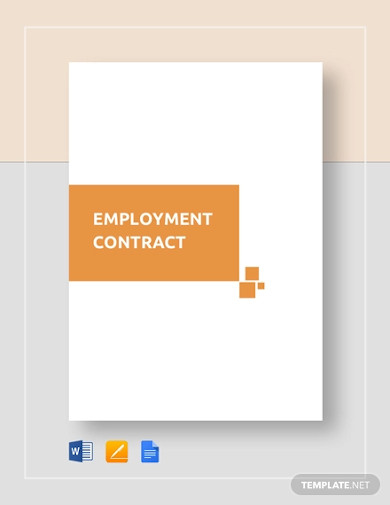
4. Hotel Employment Contract Example
5. Employment Contract for Food Catering
6. Bakery Employment Contract
What Is an Employment Contract?
As the name suggests, an employment contract is a document that legally binds an employer and an employee with labor-related rights and obligations. Tracy Hays, the owner and director of the job site First Base, said the contract can be created under two circumstances. First, it can be made when a certain organization is planning to hire someone for his or her services. Second, it can be produced when a professional is being offered a job for an organization or individual. According to Hays, the document is required to be checked by the law two months after the employment started.
At-Will Employment
Believe it or not, many employers practice at-will employment despite being prone to legal consequences. The practice is the act of offering only the basic written job offer, forgetting the in-depth employment contract to employees. By definition, it allows employers to dissociate an employee for whatever reason, except for the obvious illegal ones, like discriminatory and retaliatory. At the same time, the employees have every right to go out of the said employment anytime without facing any legal issues. Though the practice can still be adopted, wise entrepreneurs don’t recommend it because of three reasons. These reasons include the lack of documentation, the inconsistency in employee treatment, and the enforcing of unfitting punishments.
How To Create an Employment Contract
In contract writing, you have the choice not to make it longer as most would have it. As a matter of fact, the clearer, simpler, and more concise the contract is, the better. We highly understand that not everyone has the expertise in making a contract. This is why we have prepared our complete outline below to guide you in making your planned contract up to the standards.
1. Write Down the Title
Start your employment contract with a title. In setting it, you have to be very specific and simple. Titles like Employment Contract or Contract for Employment would do.
2. Introduce the Involved Parties
In an employment contract, there can only be two or three parties. The first one is the company that’s looking to integrate the second party, which is the job candidate. For some instances, a third party, in the form of a staffing agency, is involved. These participants should be well introduced to know which party holds certain rights and responsibilities.
3. Define Technical Terms
Contracts are made in formal writing. Because of this, it can’t be avoided that some terms will be too technical for some audience. To ensure that these audiences can cope up with the discussion on the later parts even with the esoteric terminologies, your contract should include a clause for the definition of terms.
4. Enumerate the Terms and Conditions
Once you have defined the complex terms, start making a list of the employment terms and conditions. This section should thoroughly tackle company policies and procedures. Not only those, but you also have to talk about your organizational culture.
5. Provide Job Description
A job description is an internal document that’s usually made separate from other forms of business documents. It completely describes a certain job position, right from the general definition of its general role to the complete list of tasks and responsibilities.
6. Set Salary Stipulations
Employment and compensation come hand in hand. Therefore, you must never forget to incorporate all the specifications on the employee’s salary. You can always refer to your company’s compensation plan and commission plan to ensure you got everything right.
7. Provide Termination Clause
Nobody wants to be an employee for the rest of his or her life. So for your employment contract, provide a termination clause that details how to cut the ties between you and the other party. You should also consider looking into your company’s termination policies and procedures.
8. Finalize
Finalizing your employment contract can be done in three steps. First, you make a request to get the document reviewed by a lawyer. Then, take into account the legal boilerplate. Lastly, you have to make a run-through of the document with the other party. If some details are not agreeable, jot them down and revise.
FAQs:
What are the different types of employment contracts?
The three types of employment contract are the following:
1. Permanent Employment Contract – applicable to employees who are working regular hours with an hourly compensation
2. Fixed-Term Contract – this contract has a specific end date
3. Casual Employment Contract – applicable for freelancers
Does a contract have a disadvantage?
Yes, they do. The greatest disadvantage of having one is that it doesn’t come cheap. If you wish to have a highly effective contract, you have to seek the services of an attorney. However, attorneys are rarely cheap.
What are blue and white collar employees?
Blue and white-collar employees are the two types of working class. Blue-collar employees refer to the employees who perform manual labors, while white-collar employees involve those who perform desk, executive, and administrative works.
Employers need legal protection against their employees’ disputes and vice versa. And, the perfect tool for that takes the form of an employment contract. Many people, employers and employees alike, thought that the advantage of such a document ends there. Little did they know, it has few more in its arsenal. Because of that fact, we can conclude that an employment contract is an essential element to keep the harmonious relationship between employers and their employees.



